No Results Found
The page you requested could not be found. Try refining your search, or use the navigation above to locate the post.
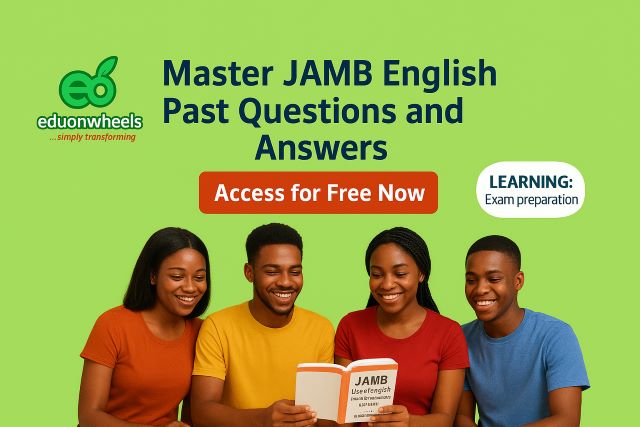
The page you requested could not be found. Try refining your search, or use the navigation above to locate the post.
Are you preparing for the JAMB UTME and looking for reliable study materials to boost your English Language performance? Eduonwheels’ JAMB UTME English Language (Use of English) Past Questions and Answers Free 2013 is your perfect resource.
This comprehensive collection provides the exact JAMB UTME English Language (Use of English) Past Questions and Answers Free 2013, helping you understand the exam pattern, question types, and key focus areas. Whether you’re revising for comprehension, lexis and structure, or oral forms, these past questions will guide your preparation and increase your confidence for the upcoming JAMB exam.
Ready to ace the Use of English paper? Download your free JAMB UTME English Language Past Questions and Answers for 2013 and boost your exam preparation today! Images: 1
Questions: Numbered 1 – 100
PASSAGE I
In 1951, the Government decided to start a Pottery Training Centre where new and more advantaged technical methods, especially glazing, could be taught. The centre was intended to serve the whole of the defunct Northern Region, and there were several reasons for choosing Abuja. The first was the excellence of the traditional pottery made in the Emirate. Secondly, firewood is plentiful; this is a most important consideration, because in the making of glazed pottery, more firewood than clay is required. Thirdly, there are good clays, and good local sources for the raw materials needed for the glazes. Fourthly, water, which is another important raw material, is plentiful. Finally, Abuja is in a central position for the whole region and is a town where learners from many different parts can find a congenial temporary home, and where the Emir and his Council are actively interested in the project.
Nearly all the making is done by a process called throwing; so called because the lumps of clay are thrown by the potter onto a wheel-head. They are weighed out so that each pot will be roughly the same size; for example, for making pint-sized jugs, the lumps of clay will be one and a half kilogrammes. The potter sits on the saddle of the wheel and spins it by pushing a pedal with his left foot. He has a bowl of water, a loofah, a bamboo knife, a pointed stick or porcupine quill, a wooden-smoothing tool which potters call a rib, and a piece of wire-like object that is used for wedging. He makes the wheel-head slightly damp, and throws the lumps into the middle. The first work is to force the lump to the centre, then he presses his thumb into the middle of the lump, using water to keep it slippery. When the bottom is of the right thickness, he begins to draw up the walls until they are of the right height. Then he shapes the belly and shoulder of the pot. He trims off any waste clay. In this way, a small and medium-sized pot can be made quickly and accurately.
Adapted from Robert, J.M.E and Smith, L.E.M (1978) Testing English language, AUP
Questions: 1 – 5
1. Which question paper type of use of English is given to you? A. type D B. type I C. type B D. type U
2. Which of the following is true according to the passage? A. pots can be made quickly and correctly B. A pot thrown on a wheel is less likely to break C. the potter does not have to work hard if he uses the wheel D. anyone, with almost no training can make pots on a wheel
3. From the passage, how does a potter make several pots of almost identical size? A. by weighing the lumps of clay B. By having the right tools C. By knowing what to do from experience D. By having the knowledge of different pots
4. The phrase (trims off any waste clay) in the passage, means to A. force the clay to the different colours B. cut the clay C. there are different colours in the clay D. cut away unnecessary parts
5. The word (congenial), as used in the passage, means A. precise B. similar C. nice D. congested
PASSAGE II
Music plays a vital role in human society. Good music provides entertainment and emotional release, and it accompanies activities ranging from dances to religious ceremonies. Music is heard everywhere; in auditoriums, homes, elevators, schools, sports arenas and on the streets. Recorded performance is a sensational innovation of the twentieth century. Thanks to modern technology like compact disc (CD) digital video disc (DVD) and the MP3 player, music can now be heard in diverse places. Such places include living rooms and cars, jogging paths can also function as new kinds of concert halls where we can hear what we want as often as we want.
Live performances provide a special excitement. In a live performance artistes put themselves on the line. To avoid embarrassment, the artiste must train beforehand and ensure that technical difficulties are avoided and that the listeners are actively involved. What is performed, how it sounds, the excitement of such a moment and feelings are exchanged between stage and hall.
Our response to a musical performance or an artiste is subjective and rooted in deep feelings. Even professional critics can differ strongly in their evaluations of a performance. There is no one ”Truth” about what we hear and feel. Does the performer project a concept, an overall idea, or an emotion? Do some sections of a piece, but not others, communicate something to you? Can you figure out why? It is up to us as listeners to evaluate performances of music so that we can fully enjoy it. People listen to music in many different ways. For instance, music can be a barely perceived background as in a film or a totally absorbing experience as in a concert.
Adapted from Roger, K. (1990) An Appreciation Music: Fourth Brief Edition, McGraw-Hill Higher Education.
6. Which of the following is true according to the passage? A. music can enhance evaluation performance B. all listeners are music makers C. all artistes are objective in their feelings D. music influences feelings at different levels
7. The expression (…stage and hall), as used in the passage, means the A. artiste and the audience B. producer and the director C. Director and audience D. artiste and his music
8. From the passage, it can be deduced that music is A. better appreciated in a crowd B. better appreciated when we are happy C. better appreciated by professional critics D. appreciated as the environment dictates
9. According to the writer, live performances provide a special excitement because they are A. interactive B. error-free and original C. educative D. stage-managed
10. According to the passage, music plays a vital role in human society because A. it is easy to appreciate music B. stage performance is the most popular music opportunity C. everybody can listen to music through the CD, MP3 and DVD D. music provides enjoyment and relief
CLOZE
PASSAGE III
Whatever may be its wider implications, the explosion of hydrogen bomb is, for the meteorologist, simply another atmospheric disturbance. It should therefore be classed with certain rare natural …..11….. such as volcanic …..12….. But there are certain features of a man-made disturbance that requires special examination. As with all events on this …..13….. It is impossible to describe what happens in details. However we can be reasonably sure of the main effects, and most impressive of these arises from …..14….. The immediate result of the …..15….. is that the air surrounding the bomb is raised very rapidly to an enormously high …..16….. The hot gases expand violently as great …..17….. compressing the air around them into what is called …..18….. or blast wave that is responsible for much of terrible destructive power of the weapon.
Another kind of wave arises because of the weight of the air. The force of the explosion lifts the …..19….. around the bomb. The gravity waves can also resemble the ordinary …..20….. Waves of this type are not normally felt by human beings and they have their effect on the weather.
Choose the most appropriate answer in the numbered 11 A. Occurrences B. Resources C. Laws D. Programmes
Choose the most appropriate answer in the numbered 12 A. exhaustion B. eruption C. expulsion D. insurrection
Choose the most appropriate answer in the numbered 13 A. skate B. snow C. scale D. scanner
Choose the most appropriate answer in the numbered 14 A. pressure volume B. pressure air C. pressure gauge D. pressure waves
Choose the most appropriate answer in the numbered 15 A. commotion B. detonation C. distortion D. reduction
Choose the most appropriate answer in the numbered 16 A. temperature B. class C. profile D. way
Choose the most appropriate answer in the numbered 17 A. fireballs B. fireworks C. fire smokes D. firearms
Choose the most appropriate answer in the numbered 18 A. shocktherapy B. shockwaves C. shocktroops D. shockjocks
Choose the most appropriate answer in the numbered 19 A. atmosphere B. space C. height D. form
Choose the most appropriate answer in the numbered 20 A. lake B. ocean C. river D. stream
This question is based on Chukwuemeka Ike’s The Potter’s Wheel.
21. In their preparation for the masquerade, David and others agreed to exercise extra caution in their dealings with Samuel because he would A. Try his tricks on them to know their secrets B. prepare well ahead of them C. put them to shame D. force them to dance with the masquerade
22. In the novel, Nwomiko was famous for her A. spiritual powers B. political struggles C. lack of spiritual powers D. lack of fighting spirit
23. “With remarkable agility, he mounted The Fallen Goliath and went on to stuff his mouth with earth” Who was the Fallen Goliath in the excerpt above? A. Cromwell B. David C. Polycarp D. Samuel
24. “If you have not beheld your chi in his stark nakedness, be prepared to do so as soon as you set foot in that man’s house.” From the excerpt above, whose house was being referred to? A. Teacher Zaccheus B. Mazi Okeke C. Mazi Laza D. Mazi Nwokike
25. In the novel, the people of Umuchukwu likened Samuel to A. An ancestral spirit B. A chief priest C. A fisherman D. A swimmer
26. Obu dashed out of the school building because A. His teacher wanted to flog him B. He came top of standard 1 C. His teacher sent him on an errand D. He was given a prize by the headmaster
27. In the novel, Bright lived with Teacher because A. He was Teacher’s nephew B. His father was indebted to Teacher C. He wanted to become a teacher D. His father had gone on a long journey
28. According to the novel, Obu was good at A. Proverbs B. Cricket C. Games D. Jokes
29. Uke was conscripted into the military because A. He was a social nuisance B. He loved the British soldiers C. His grandfather was a military man D. He wanted to travel to Burma
30. In the novel the ‘pad’ was a symbol of A. Success B. Unity C. Failure D. Love
These questions are based on Jerry Agada’s The Successes
31. It can be inferred from the novel that Mr. Eze was Terkura Atsen’s A. Uncle B. Role Model C. Boss D. Business partner
32. From the novel, David thought Ifenne should be involved in politics because he wanted him to A. Rig the election for someone B. take part in the election process C. Extort money from the people D. make a name for posterity
33. The civil war created business opportunities for people like Owoicho because: A. the Ibos were conscripted into the army B. the exit of the Ibos created a vacuum C. the Ibos had ventured into other businesses D. He became the supplier of all essential commodities
34. “My boy, your future is bright, you can be anything you want to be….” The statement above was made because Ifenne had A. been working for others to make profit B. been planning to excel C. proven himself faithful and committed D. purchased his first bus
35. The departure of Ibo competitors to the East had favoured A. Mama Okoh’s business B. Torkwase at Otukpo C. Sgt Onyilo in the war front D. Okoh’s marriage
LEXIS, STRUCTURE AND ORAL FORMS
SENTENCE INTERPRETATION
In each of these questions select the option that best explains the information conveyed in the sentence.
36. The team’s poor performance at tournament plumb the depths of horror. A. team’s performance was enjoyed by all B. the team’s performance was full of disappointment C. team’s performance was rewarded D. the team’s performance took them to the next round
37. Tolu and Chinedu live in each other’s pockets. A. they steal from each other B. they blackmail each other C. they are very close to each other D. they are long-term business partners
38. As the drama unfolded, Olatinuke was advised to keep her shirt on A. she was advised to commit herself B. she was advised to stay calm C. she was advised to join the club D. she was advised to wear her shirt
39. He is a clinging child. A. he is possessive B. he likes to cling with his sister C. he is a bully D. he is a handsome young man
40. Zinana’s examination result was not unfavourable A. Her examination did not meet expectation B. she was successful in her examination C. her result could not earn her admission D. she failed her examination
41. You need to brush up on your Spanish A. you need to improve your skills B. you need a brush from Spain C. you need to learn to play with a Spaniard D. you need to study the history of Spain
42. Amaka would pass for a beauty queen A. She would be accepted by all as a beauty Queen B. She walked past the beauty queen C. she was acting as a beauty queen D. she would pass the drink to the queen who is sitting next to her
43. ‘I can’t wait to become a mother’, the new bride declared A. she is excited about motherhood B. She is not keen on becoming a mother C. She will be patient as a mother D. She sees motherhood as a burden
44. Usman needs to get his act together if he wants to pass the examination A. He needs to organize himself B. He needs to be fast when writing the examination C. He needs to put on his stage costume D. He needs to pull all points down in the examination
45. Ramatus expressed her feelings in uncertain terms A. She expressed it secretly and courageously B. she expressed it quietly and cautiously C. She expressed it feebly and sickly D. She expressed it clearly and strongly
ANTONYMS (OPPOSITE IN MEANING)
In each of these questions choose the option opposite in meaning to the word or phrase in brackets and italics.
46. Chibuzor gave a (curt) nod and walked away A. rude B. polite C. shocking D. Gentle
47. The girl took a (cursory) glance at the letter and hid it A. Concise B. Brief C. Lasting D. Sententious
48. The relationship between the couple has been (frosty) A. Cordial B. Amenable C. Frugal D. Fraudulent
49. The Novel laureate’s activity in the field of science is (heinous) A. Laudable B. Deplorable C. forgettable D. Indelible
50. The accused was (eventually) convicted A. consequently B. subsequently C. finally D. initially
51. The (plebs) can be found in every society of the world A. Elite B. Middle class C. Politicians D. Masses
52. Everyone’s condition was (appalling) A. cloudy B. pleasant C. complex D. simple
53. The war against malaria keeps (waxing) A. Decreasing B. increasing C. wavering D. happening
54. The man’s (mordant) wit is apparent to the entire village A. scathing B. caustic C. withering D. kind
55. The soldiers tried in their (dogged) defence of the city A. strong B. indestructible C. classical D. indifferent
SYNONYMS (NEAREST IN MEANING)
Answer the following questions, choose the option nearest in meaning to the word or phrase in brackets and italics
56. Ayodeji is an (ardent) supporter of education for the girl child A. a cogent B. a passionate C. an ignorant D. an optimistic
57. The scholar’s (epitaph) was demolished A. embodiment B. farmland C. book D. monument
58. Mohammed does his work with so much (ardor) A. discouragement B. knowledge C. indifference D. enthusiasm
59. The athlete is proud to be in the (vanguard) of sports development A. leading position B. destructive position C. emerging position D. unforgettable position
60. Nwankwo was on the (verge) of signing a two year contract with the club A. brink B. summit C. height D. shore
61. The lamb is a (feeble) little animal A. loving B. weak C. fat D. quiet
62. I am tired of your (eternal) argument A. constant B. useless C. open D. strong
63. The actress (screamed) when she noticed an object behind her A. weeded in B. stormed out C. wailed D. protested
64. The (exhibition) was an eye opener to all A. style B. examination C. dispatch D. display
65. As a journalist, Bala has always had a (nose for) stories A. an instinct B. a command C. soft comment D. cynical statement
SENTENCE COMPLETION
Choose the option that best completes the gap(s)
66. The girl says she is averse……what others admire A. to B. with C. for D. from
67. Our teacher defined ……in his introductory lesson A. onomatopoeia B. onomatopieoa C. onomatopiea D. Onomatopoia
68. The philanthropist devoted himself……the poor A. by helping B. to be helping C. to helping D. in helping
69. Tinu likes apples……she does not like oranges A. so B. but C. or D. do
70. The students had a …..On Independence Day. A. march pass B. match past C. march past D. match pass
71. Do you mind……another hour or two? A. wait B. waiting C. to wait D. to have waited
72. The continuous rain has really …….the soil. A. satiated B. saturated C. melted up D. mopped up
73. The police described the boy as being…..hand A. over at B. out of C. on by D. up to
74. It was very easy for the two political parties to form a …….Government A. collusion B. coalition C. co-operative D. colonial
75. All farmers were encouraged ……carry out fumigation on their farms A. in B. with C. to D. from
76. There are lots of…..in a park A. moving fast luxury buses B. fast moving luxury buses C. luxury buses moving fast D. luxury buses fast moving
77. Yours is to command…..is to obey A. theirs’ B. their’s C. their D. theirs
78. Local governments are authorized to pass A. bye laws B. byes-laws C. bye’s law D. bye-law
79. Umar: I have never visited the dentist Aliyu: ……? A. neither myself B. I myself haven’t C. neither have I D. I also never
80. Usman would have won the race….. A. only if he could run fast B. if he had run fast C. if he can run faster D. although he ran fast
81. My father told me to take the money from …..it A. whomever offers B. whomsoever offer C. ever who offers D. whoever offers
82. Our teacher defined…….as the killing of one’s mother A. matriarch B. patricide C. patriarch D. matricide
83. If you are confused…….anything, phone my office A. of B. with C. about D. for
84. We have a family mutiny……our hands A. on B. for C. from D. of
85. We should try to help….. A. the less fortunate B. less fortunates C. the less fortunate D. this less fortunate
PHONETICS – VOWEL SOUND
Choose the option that has same vowel sound as the one represented by the letter(s) in brackets and italics.
86. gl*(a)*cier A. feign B. glass C. gleam D. flat
87. l*(au)*d A. lathe B. core C. lavatory D. loud
88. C*(o)*ma A. come B. comma C. colonel D. cogent
PHONETIC – CONSONANT SOUND
Choose the option that has the same consonant sound as the one represented by the letter in brackets and italics.
89. lo*(s)*e A. noise B. horse C. mouse D. Nurse
90. *(g)*uitar A. judge B. rogue C. jam D. strange
91. loo*(s)*e A. close B. rouse C. sell D. fuse
WORD RHYME
Choose the option that rhymes with the given word
92. rite A. wright B. rim C. list D. rice
93. joys A. boys B. stays C. elbow D. pots
94. call A. dull B. slate C. wall D. quail
WORD STRESS PATTERN
Choose the most appropriate stress pattern from the options. The stressed syllables are written in capital letters.
95. dedication A. dediCAtion B. DEdication C. dedicaTION D. DeDIcation
96. International A. INternational B. inTERnational C. interNAtional D. internaTIONal
97. Information A. inFORmation B. INformation C. inforMAtion D. informaTION
EMPHATIC STRESS
The word in capital letters has the emphatic stress. Choose the option to which the given sentence relates.
98. Adamu is leaving a CAR behind? A. who is leaving a car behind? B. where is Adamu leaving a car? C. what is Adamu leaving behind? D. is Adamu driving the car in front?
99. Lambusa TOOK OFF the wig A. Did Lambusa take off a wig? B. Did Lambusa take off the ring? C. who took off the wig? D. What did Lambusa do?
100. The bed is IN the room A. Was the bed in the room? B. what is in the room? C. where is the bed? D. is the bed in the parlour?
JAMB UTME Use of English exam? Eduonwheels provides comprehensive resources for English Language teaching and learning, specifically designed for JAMB students preparing for their exams. Get started with our free 2013 past questions!
Answers: Numbered 1 – 100
Ready to ace your JAMB UTME Use of English? Get FREE ACCESS now to a wealth of Past Questions & Answers, including those from 2001! Our resources cover everything from Comprehension to Phonetics, Synonyms, and Antonyms. Build confidence and excel! #JAMB #UTME #UseOfEnglish #PastQuestions #FreeStudy #Nigeria
Answer Explanations: Numbered 1 – 100
1. C – The question paper type is indicated in the original document as Type B.
2. A – The passage explicitly states “In this way, a small and medium-sized pot can be made quickly and accurately,” confirming that pots can be made quickly and correctly.
3. A – The passage mentions “They are weighed out so that each pot will be roughly the same size,” indicating that weighing the lumps of clay ensures similar sizes.
4. D – “Trims off any waste clay” means to cut away or remove unnecessary parts of the clay after shaping the pot.
5. C – “Congenial” means pleasant, agreeable, or nice, referring to a welcoming temporary home for learners.
6. D – The passage discusses how music influences people’s emotions and feelings at different levels, from background music to absorbing concert experiences.
7. A – “Stage and hall” refers to the artiste performing on stage and the audience in the hall, representing the exchange between performer and listeners.
8. D – The passage explains that music can be appreciated differently depending on the environment – as background in films or as an absorbing experience in concerts.
9. A – Live performances are described as interactive because “the listeners are actively involved” and “feelings are exchanged between stage and hall.”
10. D – The passage states that “Good music provides entertainment and emotional release,” which means it provides enjoyment and relief.
11. A – “Occurrences” fits the context of natural events like volcanic eruptions that are atmospheric disturbances.
12. B – “Eruption” is the correct term for volcanic activity, which is a natural atmospheric disturbance.
13. C – “Scale” is appropriate here, referring to the scale or magnitude of events.
14. D – “Pressure waves” makes sense as the impressive effect arising from the explosion.
15. B – “Detonation” is the correct term for the explosion of a bomb.
16. A – “Temperature” is the logical completion, as the air is raised to a high temperature.
17. A – “Fireballs” describes the hot gases expanding violently from the explosion.
18. B – “Shockwaves” is the correct term for the blast wave created by the explosion.
19. A – “Atmosphere” refers to the air around the bomb that is lifted by the explosion.
20. B – “Ocean” waves are a natural comparison for gravity waves.
21. A – Samuel was known for his tricks and would try to discover the secrets of David and others.
22. A – Nwomiko was renowned for her spiritual powers in the novel.
23. D – Samuel was referred to as “The Fallen Goliath” in this excerpt.
24. B – The reference to “beholding your chi in stark nakedness” refers to Mazi Okeke’s house.
25. D – The people of Umuchukwu compared Samuel to a swimmer.
26. B – Obu dashed out excitedly because he came top of standard 1.
27. B – Bright lived with Teacher because his father owed Teacher money.
28. A – Obu had a talent for using proverbs appropriately.
29. A – Uke was conscripted into the military because he was considered a social nuisance.
30. C – The ‘pad’ symbolized failure in the novel.
31. B – Mr. Eze served as a role model for Terkura Atsen.
32. B – David wanted Ifenne to participate in the democratic election process.
33. B – The departure of Ibo businessmen created a vacuum that Owoicho could fill.
34. C – The statement was made because Ifenne had demonstrated faithfulness and commitment in his work.
35. A – Mama Okoh’s business benefited from the absence of Ibo competitors.
36. B – “Plumb the depths of horror” means the performance was extremely disappointing.
37. C – “Live in each other’s pockets” is an idiom meaning they are very close to each other.
38. B – “Keep her shirt on” is an idiom meaning to stay calm or not get upset.
39. A – A “clinging child” is one who is possessive and doesn’t want to be separated from parents or caregivers.
40. B – “Not unfavourable” is a double negative meaning favourable or successful.
41. A – “Brush up on” means to improve or refresh your skills in something.
42. A – “Pass for” means to be accepted or recognized as something.
43. A – “Can’t wait” expresses excitement and eagerness about motherhood.
44. A – “Get his act together” means to organize himself and become more focused.
45. D – “In no uncertain terms” (not “uncertain terms”) means clearly and strongly, but the question as written suggests the opposite interpretation, making D the intended answer.
46. B – “Curt” means abrupt or rude, so the opposite is “polite.”
47. C – “Cursory” means brief or hasty, so the opposite is “lasting” or thorough.
48. A – “Frosty” means cold or unfriendly, so the opposite is “cordial” or warm.
49. A – “Heinous” means shockingly evil or wicked, so the opposite is “laudable” or praiseworthy.
50. D – “Eventually” means finally or ultimately, so the opposite is “initially” or at the beginning.
51. A – “Plebs” refers to common people or masses, so the opposite is “elite.”
52. B – “Appalling” means shocking or terrible, so the opposite is “pleasant.”
53. A – “Waxing” means growing or increasing, so the opposite is “decreasing.”
54. D – “Mordant” means harsh or biting, so the opposite is “kind.”
55. D – “Dogged” means persistent or determined, so the opposite is “indifferent.”
56. B – “Ardent” means passionate or enthusiastic.
57. D – An “epitaph” is an inscription on a monument or tombstone (though this seems to be confused with “monument” itself in the context).
58. D – “Ardor” means enthusiasm or passion.
59. A – “Vanguard” means the leading position or forefront.
60. A – “Verge” means brink or edge, as in being on the point of something.
61. B – “Feeble” means weak or frail.
62. A – “Eternal” means constant or never-ending.
63. C – “Screamed” is similar to “wailed” – both express loud vocalization.
64. D – “Exhibition” means display or showing.
65. A – “Nose for” means an instinct or natural ability to detect or find something.
66. A – “Averse to” is the correct prepositional phrase meaning opposed to or against something.
67. A – “Onomatopoeia” is the correct spelling for words that imitate sounds.
68. C – “Devoted himself to helping” is the correct structure using the gerund form after “to.”
69. B – “But” is the appropriate conjunction to show contrast between liking apples and not liking oranges.
70. C – “March past” is the correct term for a ceremonial parade or procession.
71. B – “Mind” is followed by a gerund, so “waiting” is correct.
72. B – “Saturated” means completely soaked or filled with water, which is appropriate for soil after continuous rain.
73. B – “Out of hand” means beyond control or difficult to manage.
74. B – “Coalition” is the correct term for a temporary alliance between political parties to form a government.
75. C – “Encouraged to” is the correct prepositional phrase to use with “encouraged.”
76. B – “Fast moving luxury buses” follows the correct order of adjectives: manner/speed, then type/purpose.
77. D – “Theirs” is the correct possessive pronoun (no apostrophe needed).
78. A – “Bye laws” (or “bylaws”) are local regulations passed by local governments.
79. C – “Neither have I” is the correct response showing agreement with a negative statement.
80. B – “If he had run fast” is the correct past perfect conditional structure for an unreal past condition.
81. D – “Whoever offers” is correct; “whoever” is the subject of “offers” and takes the nominative case.
82. D – “Matricide” is the correct term for killing one’s mother (matri- = mother, -cide = killing).
83. C – “Confused about” is the correct prepositional phrase.
84. A – “On our hands” is the correct idiom meaning we have a problem to deal with.
85. C – “The less fortunate” is correct; it refers to people who are less fortunate and doesn’t need to be plural.
86. A – The “a” in “glacier” makes an /eɪ/ sound (long a), similar to “feign.”
87. B – The “au” in “laud” makes an /ɔː/ sound, similar to “core.”
88. C – The “o” in “coma” makes an /oʊ/ sound, similar to the “o” in “colonel.”
89. A – The “s” in “lose” makes a /z/ sound, similar to the “s” in “noise.”
90. B – The “g” in “guitar” makes a /g/ sound, similar to “rogue” (not the /dʒ/ sound in “judge” or “jam”).
91. D – The “s” in “loose” makes an /s/ sound, similar to the “s” in “fuse.”
92. A – “Rite” and “wright” rhyme perfectly (both pronounced /raɪt/).
93. A – “Joys” and “boys” rhyme (both end with the /ɔɪz/ sound).
94. C – “Call” and “wall” rhyme (both end with the /ɔːl/ sound).
95. C – The stress in “dedication” falls on the third syllable: dedi-CA-tion.
96. C – The stress in “international” falls on the third syllable: inter-NA-tional.
97. A – The stress in “information” falls on the third syllable: in-FOR-mation.
98. C – When “CAR” is emphasized, it implies the question is about what Adamu is leaving behind (as opposed to something else).
99. B – When “TOOK OFF” is emphasized, it contrasts with another action, suggesting the question is about whether he took off the wig or something else (like a ring).
100. D – When “IN” is emphasized, it contrasts with another location, suggesting the question is whether the bed is in the room or elsewhere (like the parlour).
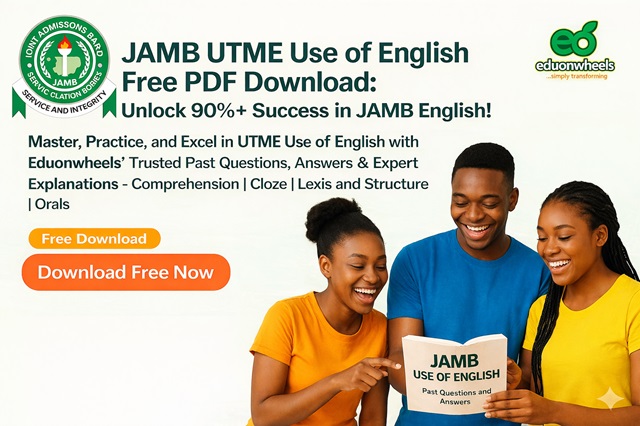
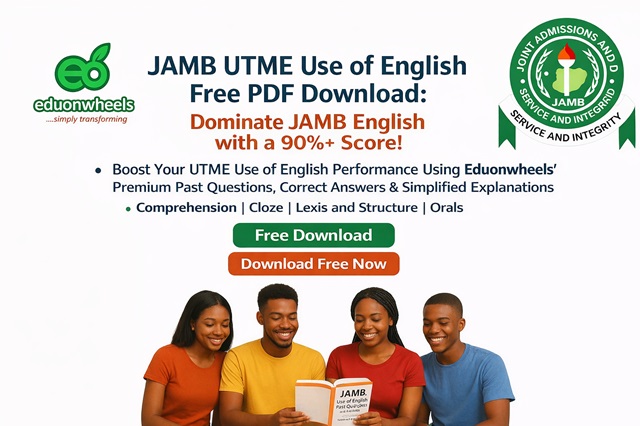
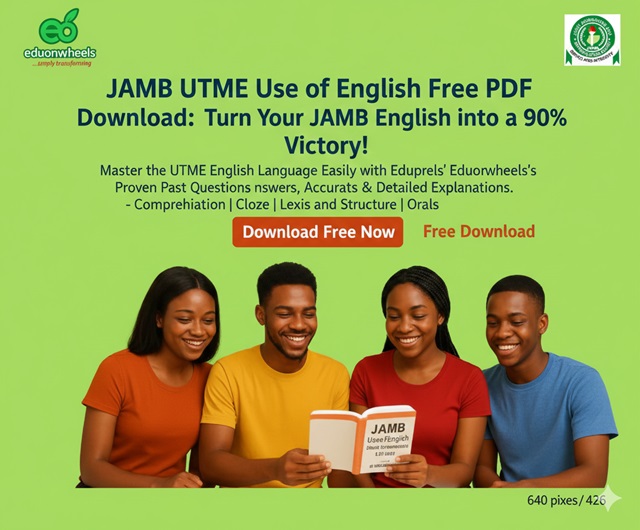


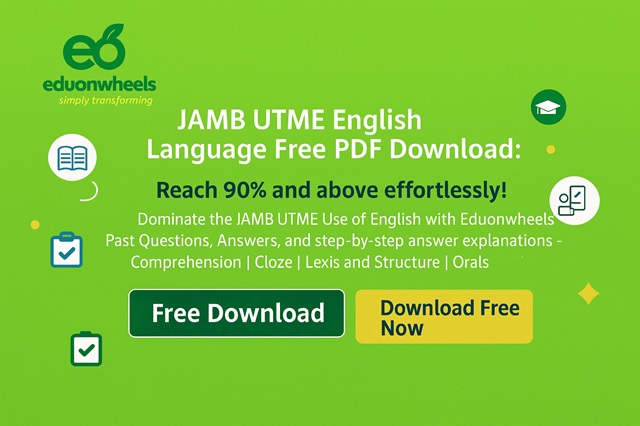












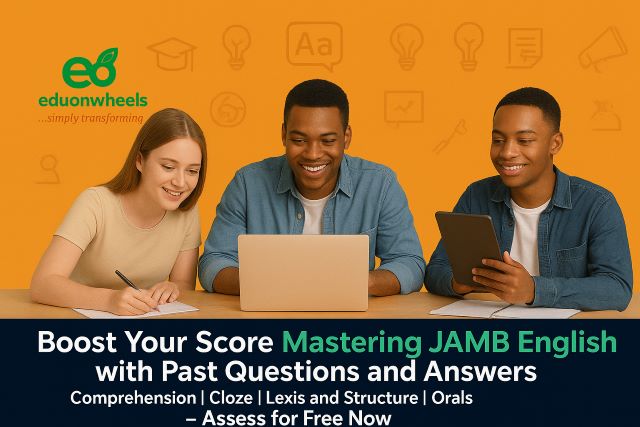
0 Comments